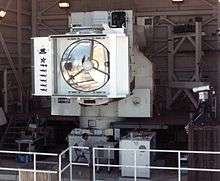MIRACL

MIRACL, or Mid-Infrared Advanced Chemical Laser, is a directed energy weapon developed by the US Navy. It is a deuterium fluoride laser, a type of chemical laser.
The MIRACL laser first became operational in 1980.[1] It can produce over a megawatt of output for up to 70 seconds,[2] making it the most powerful continuous wave (CW) laser in the US.[3] Its original goal was to be able to track and destroy anti-ship cruise missiles, but in later years it was used to test phenomenologies associated with national anti-ballistic and anti-satellite laser weapons. Originally tested at a contractor facility in California, as of the later 1990s and early 2000s, it was located at a facility (32°37′55″N 106°19′55″W / 32.632°N 106.332°W) in the White Sands Missile Range in New Mexico.[4]
The beam size in the resonator is about 21 cm (8.3 in) high and 3 cm (1.2 in) wide.[2] The beam is then reshaped to a 14 x 14 cm (5.5 in x 5.5 in) square.[2]
Amid much controversy in October 1997, MIRACL was tested against MSTI-3, a US Air Force satellite at the end of its original mission in orbit [5] at a distance of 432 km (268 mi).[6] MIRACL failed during the test and was damaged[7] and the Pentagon claimed mixed results for other portions of the test. A second, lower-powered chemical laser was able to temporarily blind the MSTI-3 sensors during the test.[8]
References
- ↑ U.S. Army Space and Missile Defense Command. "MIRACL at HELSTF". Retrieved 2007-07-05.
- 1 2 3 Sherman, Robert. "Mid-Infrared Advanced Chemical Laser (MIRACL)". Retrieved 2007-07-05.
- ↑ Airborne Laser System Program Office. "Airborne Laser (YAL1A)" (PDF). Archived from the original (PDF) on 2007-03-24. Retrieved 2007-07-05.
- ↑ U.S. Department of Defense. "Secretary of Defense approves laser experiment to improve satellite protection". Retrieved 2007-07-05.
- ↑ Plante, Chris (1997-10-20). "Pentagon beams over military laser test". CNN.com. Associated Press and Reuters. Archived from the original on 2007-12-30.
- ↑ Zack, Ed. "Miniature Sensor Technology Integration (MSTI)". Retrieved 2007-07-05.
- ↑ MIRACL damaged in experiment. Journal of Aerospace and Defense Industry News. December 11, 1997. via webarchive.org Accessed May 3, 2014.
- ↑ Koplow, David A. Death by Moderation: The U.S. Military's Quest for Useable Weapons. Cambridge University Press, 2010. Accessed May 3, 2014.
- Lowery, Todd (Jan 1998) "Call it a Miracl" Bulletin of the Atomic Scientists Vol. 54, No. 1:5,6
- Lambakis, Steven (2013) On the Edge of Earth: The Future of American Space Power ISBN 0813145783 pg 63